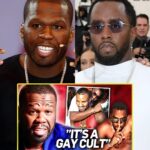**Oprah Winfrey and 50 Cent: A History of Tension and Controversy**
In the world of entertainment, clashes between celebrities are not uncommon, often fueled by personal disagreements or conflicting professional ambitions. One such longstanding feud exists between media mogul Oprah Winfrey and renowned rapper 50 Cent, characterized by public spats and differing viewpoints on significant social issues.

The rift between Oprah and 50 Cent first gained public attention when Oprah took a firm stance against the use of racial slurs, a campaign that 50 Cent perceived as a personal attack. This disagreement set the stage for a broader divide between them, highlighting their contrasting backgrounds and viewpoints.
For 50 Cent, who rose from Jamaica, Queens, to international fame, appearing on Oprah’s show was not just a career milestone but also a validation of his success.
However, his attempts to secure a spot on her show were met with rejection, with Oprah reportedly dismissing his music and refusing to host him. This rejection deeply impacted 50 Cent, who saw Oprah’s endorsement as a measure of acceptance within the entertainment industry.
Adding fuel to the fire, 50 Cent publicly criticized Oprah for what he perceived as her selective treatment of black artists and her close associations with controversial figures in Hollywood. He accused Oprah of turning a blind eye to alleged misconduct by powerful individuals such as Harvey Weinstein, while simultaneously targeting black celebrities like Russell Simmons and Michael Jackson.
This perceived inconsistency in Oprah’s advocacy sparked widespread debate and criticism, with 50 Cent using his platform to call attention to what he viewed as double standards within the industry.
The tension escalated further when 50 Cent named one of his dogs “Oprah,” a provocative gesture that underscored his disdain for the media icon. This symbolic act not only reflected his ongoing resentment but also became emblematic of their strained relationship.
Beyond personal grievances, 50 Cent accused Oprah of underpaying black actors, citing instances where actresses like Taraji P. Henson allegedly received less than their white counterparts for similar roles.
The feud took another turn when Oprah faced backlash for her handling of sensitive interviews and controversial topics. Critics pointed to her extensive coverage of Michael Jackson’s accusers in the documentary “Leaving Neverland,” contrasting it with her relative silence on allegations against figures like Harvey Weinstein. This disparity in Oprah’s approach raised questions about her role in the public discourse and her perceived biases in addressing issues of social justice and accountability.
Additionally, Oprah’s relationship with Mo’Nique, an acclaimed actress, became strained over issues of compensation and professional respect. Mo’Nique publicly accused Oprah of contributing to her marginalization in Hollywood, alleging that Oprah’s influence played a role in her struggles to secure significant roles following her Oscar-winning performance in “Precious.”
In response to these controversies, 50 Cent emerged as a vocal critic of what he viewed as Oprah’s failure to support black artists and her inconsistent stance on matters of justice and equality. His advocacy for Mo’Nique and other marginalized figures in Hollywood underscored his commitment to transparency and fairness within the entertainment industry.
As the feud between Oprah Winfrey and 50 Cent continues to unfold, it raises broader questions about power dynamics and accountability in Hollywood. Their clash reflects larger debates about representation, fairness in media coverage, and the responsibilities of influential figures in shaping public discourse.
In conclusion, the ongoing tension between Oprah Winfrey and 50 Cent serves as a poignant reminder of the complexities within the entertainment industry and the enduring impact of personal and professional disagreements on public perception.









































































































































































































































































































